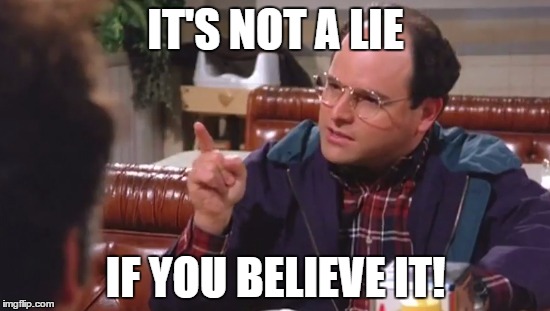
Posted on 09/27/2018 7:51:26 AM PDT by SeekAndFind
Cognitive scientists have learned that people can be 100 percent certain of their memories . . . and 100 percent wrong.
‘Beyond a reasonable doubt” is not a phrase found in the Constitution. Yet these four words, which begin appearing in United States jurisdiction around 1798, have become legal cliché. In 1970, the Supreme Court cited them as the evidentiary gold standard (though in 1990 the Court distinguished it from “moral certainty”). Now we tend to think of “reasonable doubt” as a safety net for the accused. But it did not begin this way. In fact, legal scholars say that the need for proof beyond “reasonable doubt” comes from Christian theology and was originally enshrined in law to prevent jurors from damning themselves by bearing false witness.
. . . to prevent jurors from damning themselves by bearing false witness.
“False witness” is either lying outright or knowingly playing fast and loose with facts. Which makes it a particularly jarring phrase this week, given that Christine Blasey Ford is scheduled to testify before the Senate Judiciary Committee tomorrow. A possible counter-explanation of Ford’s story would be to say that she has a “false memory,” not that she is bearing “false witness.”
What if we were to leave this national political circus for a moment and step inside a well-established branch of neuropsychology? A science that, over the past few decades, has revealed just how easily our memories become distorted.
Dr. Elizabeth Loftus, a cognitive scientist and law professor who has studied memory for more than 40 years, with a particular focus on how it unfolds in the courtroom, has advanced a number of illuminating studies over the years. One gathered information on 300 people in the United States who had gone to prison for crimes they did not commit, as proved by later DNA evidence. Of those 300 (some of whom were imprisoned as long as 30 years), three-quarters of the convictions were the result of the false memories of the accuser.
Though Dr. Loftus’s findings have been unpopular among some, the first case she investigated convinced her of the importance of her work. In the 1980s, Steve Titus was falsely accused of rape. Plain and simple: The accusation was the result of a misidentification. The victim had first picked him out of lineup, saying, “That one’s the closest,” meaning that she thought he most closely resembled the attacker. Later in the witness box, she stated, “I’m absolutely positive that’s the man.” Titus was sent to prison but then released, with the help of an investigative reporter who found the real rapist. The journalist won the Pulitzer prize. But Titus lost everything: his job, his fiancée, his savings. He died of a stress-related heart attack shortly after, at age 35.
It’s a tragic story and — other than the real rapist — one with no villains. It’s why Dr. Loftus believes that jurors should be made aware of the function of “false memory” when listening to witness testimony. She explains that memory functions “like a Wikipedia page” that one can go back and edit, as others can, too.
Dr. Loftus began conducting research in response to certain types of psychotherapies that became popularized in the 1970s, including hypnosis, exposure to false information, and dream interpretation. She had begun to notice that many patients who were going into these therapies with one set of issues (such as depression or anxiety) were coming out with another set of issues (“recovered” false memories of trauma). Dr. Loftus designed experiments to explore what was occurring in these mental processes.
During her studies — approved by the relevant ethics authorities — her team successfully planted in the participants false memories of being attacked by an aggressive animal, witnessing a demonic possession, and being nearly drowned in childhood. Another study looked at members of the U.S. military who were violently interrogated, fed suggestive questions, and then asked to identify their interrogator. Many completely misremembered the physical appearance of their interrogator, which resulted in — sometimes drastic — misidentifications.
“What these studies are showing is that when you feed people misinformation about some experience that they may have had, you can distort, contaminate, or change their memory. Out in the real world, misinformation is everywhere.” She said, citing media as a prominent example.
In one TED talk, Dr. Loftus concluded:
If I’ve learned anything from my decades working on these problems, it’s this: Just because somebody tells you something and they say it with lots of confidence, detail, and emotion does not mean that it really happened. We can’t reliably distinguish true memories from false memories; we need independent corroboration. Such a discovery has made me more tolerant of friends and family who misremember. Such a discovery might have saved Steve Titus. We should all keep in mind that memory, like liberty, is a fragile thing.
She is not alone in the field, of course. In 1990, the McMartin preschool trial came to an end, seven years after allegations surfaced of outrageous, satanic sex abuse of toddlers. It was the most expensive criminal trial in American history; at its end, all charges were dropped. The mother who made the initial accusation was diagnosed as a paranoid schizophrenic (she stated that she’d seen one of the alleged abusers fly through the air) and later found dead from complications of alcoholism. In the wake of this trial and other satanic-abuse hysteria sweeping the country at the time, “false memories” became a prominent phrase in neuropsychological research.
Now, Harvard psychologist Daniel Schacter explains that false memories form partly because our brains are constructive — they create narratives about our future, which might lead to related memory errors about our past. Elizabeth Phelps, a psychologist at New York University, reports in Identifying the Culprit: Assessing Eyewitness Identification that “unknown to the individual, memories are forgotten, reconstructed, updated, and distorted.”
Of course, when it comes to law, scientific rigor is key. Lawyers and judges therefore tend to seek independent corroboration — especially corroboration at the time of the incident.
The hearsay and allegations in Kavanaugh’s case are well chronicled in the media, and there’s no need to reiterate them here. But suffice it to say that proving guilt “beyond a reasonable doubt” is not only a requirement for jurors but for all of us who dare to publicly speculate on matters that are so grave for both the accuser and the accused.
Most of us will never know with any degree of certainty whether Ford’s memory is true or false. So if we must play the part of juror in this unseemly public pseudo-trial, let’s be like the eighth juror in 12 Angry Men.
It’s always difficult to keep personal prejudice out of a thing like this. And wherever you run into it, prejudice always obscures the truth. I don’t really know what the truth is. I don’t suppose anybody will ever really know. Nine of us now seem to feel that the defendant is innocent, but we’re just gambling on probabilities — we may be wrong. We may be trying to let a guilty man go free, I don’t know. Nobody really can. But we have a reasonable doubt, and that’s something that’s very valuable in our system. No jury can declare a man guilty unless it’s sure.

This woman is garbage. She is trying to destroy a persons life. I hope the is sued into destruction. I hope the Senate holds her in contempt.
I don’t she’s able to connect much on the dots of her adolescent memory (too much alcohol in the teens). I think if the GOP can just get this meeting over, and stage the vote....then it’s done. But right now...I’m only giving it a 60-percent chance of a positive vote.
Lot’s of ways to trigger the “certainty” reflex. Anyone care to enumerate them?
Some dreams are so real you actually believe it happened.
Had an ex-wife who got hooked up with a counselor who then referred her to a hospital that specialized in “repressed memories”.
The recalled memories were so outlandish that it seemed aliens had kidnapped her and implanted stuff. Things that could never be possible were recalled.
Surprisingly she was “cured” the day that the insurance had paid out its maximum mental health benefit.
Repressed memories just paid for the doctor’s second or third sports car...
Have you ever had a dream that you, um, you had, your, you- you could, you’ll do, you- you wants, you, you could do so, you- you’ll do, you could- you, you want, you want them to do you so much you could do anything?
One day I went grocery shopping to purchase the ingredients I needed for a recipe. A few days later, I went to the cabinet to gather those ingredients, and couldn’t find any of them. Purchasing those ingredients was a vivid dream.
One day I asked my daughter to take me to a particular place to purchase some plants for my pond. When we got there, it was a motorcycle shop, not a portion d plant place. In my vivid dream, I had turned that shop into a plant store!
So yes, dreams can be very vivid and life-like.
They can also be 100% lying.

Emotionally charged memories are most easily altered.
If I have an emotional person for a few hours I could have them thinking their skin was green and their pants were on fire every time they sat down.
I would not do it due to ethics, but it is easy to reprogram the emotional subconscious. I used to do it with ultra depth hypnosis, something I stopped doing over 20 years ago due to the dangers of programming false memories.
Emotional people are already partially hypnotized.
It’s always difficult to keep personal prejudice out of a thing like this. And wherever you run into it, prejudice always obscures the truth. I don’t really know what the truth is. I don’t suppose anybody will ever really know. Nine of us now seem to feel that the defendant is innocent, but we’re just gambling on probabilities — we may be wrong. We may be trying to let a guilty man go free, I don’t know. Nobody really can. But we have a reasonable doubt, and that’s something that’s very valuable in our system. No jury can declare a man guilty unless it’s sure.
Was Ford on medications when she did the polygraph for flight anxiety or her grandmother’s funeral?
McMartin Preschool. We learn nothing
But when it comes to a conservative white man, they think a false accusation is impossible.
It has been said that conservatives believe something when they see it. Liberals, on the other hand,see something when they believe it.
Government is the Religion of the Left.
So true.
Obama's recollections of his success at creating our soaring economy, taking credit away from President Trump. Despite most people knowing Obama failed the economy during his watch. Then again, Obama is an a-h*le and lies constantly.
Something to think about.....
70% of convictions overturned by DNA evidence involved eyewitness misidentification.
32% involved MULTIPLE MISIDENTIFICATIONS of the same person.
Source: The Innocence Project
Disclaimer: Opinions posted on Free Republic are those of the individual posters and do not necessarily represent the opinion of Free Republic or its management. All materials posted herein are protected by copyright law and the exemption for fair use of copyrighted works.